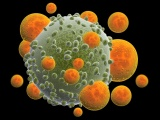

CiRA: Developed universal iPS cells: Cancer immunotherapy
-Center for iPS Cell Research and Application (CiRA), Kyoto University-
Proliferative Differentiation Mechanism Research Division
New Professor Kaneko:
Researcher Wang Hiroshi:Research group by genome editing
By modifying multiple genes of allogeneic iPS cells,
Rejection is unlikely to occur,
Create universal iPS cells.Used for cancer immunotherapy:
Universal iPS cells,
By inducing differentiation into T cells
Produced T cells derived from allogeneic iPS cells.“This universal iPS cell can be used for cancer immunotherapy,” he said.
Knock out PVR gene:
In addition to “multiple known genetic modifications”
“Knock out PVR genes associated with NK cell regulation”.
Confirmed that it is even easier to escape from NK cell attacks.
reaserch result:
Published in the online version of Nature Biomedical Engineering magazine on May 18, 2021.
Nikkei Biotech ONLINE
https://bio.nikkeibp.co.jp/atcl/news/p1/21/05/17/08165/
CiRA: iPS cells x genome editing
-Creating “Stealth Fighter T Cells” for Cancer Immunotherapy-
New Cancer Immunotherapy:
We have created a new “Stealth Fighter T cell”.
Genome editing is applied to iPS cells to create T cells that are not attacked by the immune cells at the transplant destination.
CAR gene transfer into T cells:
The CAR gene was introduced into the prepared T cells and transplanted into a mouse model with tumors and human immune cells.
When observed, it was observed that T cells were shrinking the tumor while avoiding the reaction of human immune cells.
Universal Cancer Immunotherapy:
The T cells produced by this method do not need to match the donor and recipient types.
In other words, it does not choose the patient,
As a universal cancer immunotherapy
It can be expected to be widely used.
1. Abstract
Immunotherapy, in which T cells are transplanted, is attracting attention as one of the treatment methods for cancer.
When transplanting another person’s T cells into the patient instead of the patient’s own cells, the recipient’s immune rejection needs to be controlled.
Hiroshi Wang (CiRA Proliferation and Differentiation Mechanism Research Division)
New Professor Kaneko (CiRA Department)
Research group:
First, iPS cells were genome-edited to differentiate them into T cells.
Not attacked by the recipient’s immune cells
Moreover, it attacks cancer cells,
We have succeeded in producing “Stealth Fighter T cells”.
CiRA | Center for iPS Cell Research and Application, Kyoto University
https://www.cira.kyoto-u.ac.jp/j/pressrelease/news/210518-000000.html
Cancer immunotherapies for all patients
Cancer immunotherapies
have made the news for their startling effectiveness against certain cancers.
However, current clinical therapies
mainly use the patient’s own cells, limiting the number of patients who have access to this cure.
CiRA Professor Shin Kaneko
is developing iPS cells technology that would make cancer immunotherapies available to all patients.
In a new study, his research team
reports how gene editing iPS cells leads to a universal cancer immunotherapy that does not depend on the patient’s cells.
Cancer immunotherapies
describe a family of therapies that use the patient’s own immune system to fight cancer.
In adoptive cell therapies,
immune cells found in the tumor are removed, processed to enhance their anti-cancer potency, and returned to the patient.
“There is a lot of excitement about adoptive cell therapies. However, the processing takes time during which the patient’s condition worsens. Plus, depending on the patient’s condition, sometimes the cells cannot be used,”
explained Kaneko.
CiRA | Center for iPS Cell Research and Application, Kyoto University
https://www.cira.kyoto-u.ac.jp/e/pressrelease/news/210518-000000.html
Generation of hypoimmunogenic T cells from genetically engineered allogeneic human induced pluripotent stem cells |
Nature Biomedical Engineering